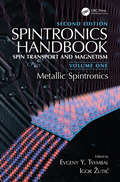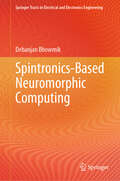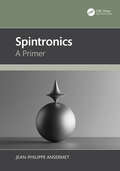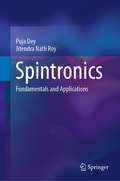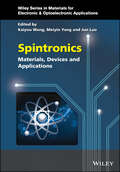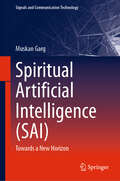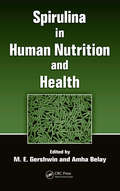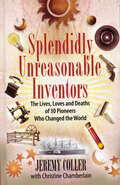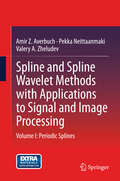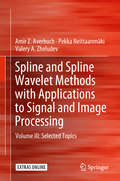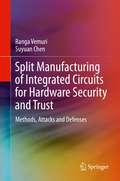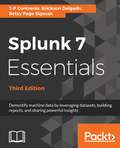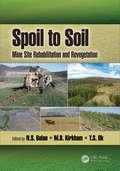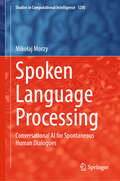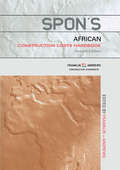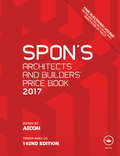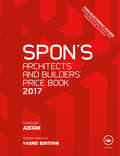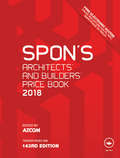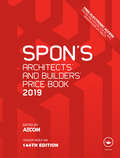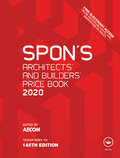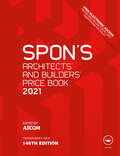- Table View
- List View
Spintronics Handbook, Second Edition: Volume One: Metallic Spintronics
by Igor Žutić Evgeny TsymbalSpintronics Handbook, Second Edition offers an update on the single most comprehensive survey of the two intertwined fields of spintronics and magnetism, covering the diverse array of materials and structures, including silicon, organic semiconductors, carbon nanotubes, graphene, and engineered nanostructures. It focuses on seminal pioneering work, together with the latest in cutting-edge advances, notably extended discussion of two-dimensional materials beyond graphene, topological insulators, skyrmions, and molecular spintronics. The main sections cover physical phenomena, spin-dependent tunneling, control of spin and magnetism in semiconductors, and spin-based applications.
Spintronics Handbook, Second Edition: Volume Three: Nanoscale Spintronics and Applications
by Igor Žutić Evgeny TsymbalSpintronics Handbook, Second Edition offers an update on the single most comprehensive survey of the two intertwined fields of spintronics and magnetism, covering the diverse array of materials and structures, including silicon, organic semiconductors, carbon nanotubes, graphene, and engineered nanostructures. It focuses on seminal pioneering work, together with the latest in cutting-edge advances, notably extended discussion of two-dimensional materials beyond graphene, topological insulators, skyrmions, and molecular spintronics. The main sections cover physical phenomena, spin-dependent tunneling, control of spin and magnetism in semiconductors, and spin-based applications. Features: Presents the most comprehensive reference text for the overlapping fields of spintronics (spin transport) andmagnetism. Covers the full spectrum of materials and structures, from silicon and organic semiconductors to carbon nanotubes, graphene, and engineered nanostructures. Extends coverage of two-dimensional materials beyond graphene, including molybdenum disulfide and study of their spin relaxation mechanisms Includes new dedicated chapters on cutting-edge topics such as spin-orbit torques, topological insulators, half metals, complex oxide materials and skyrmions. Discusses important emerging areas of spintronics with superconductors, spin-wave spintronics, benchmarking of spintronics devices, and theory and experimental approaches to molecular spintronics. Evgeny Tsymbal's research is focused on computational materials science aiming at the understanding of fundamental properties of advanced ferromagnetic and ferroelectric nanostructures and materials relevant to nanoelectronics and spintronics. He is a George Holmes University Distinguished Professor at the Department of Physics and Astronomy of the University of Nebraska-Lincoln (UNL), Director of the UNL’s Materials Research Science and Engineering Center (MRSEC), and Director of the multi-institutional Center for NanoFerroic Devices (CNFD). Igor Žutić received his Ph.D. in theoretical physics at the University of Minnesota. His work spans a range of topics from high-temperature superconductors and ferromagnetism that can get stronger as the temperature is increased, to prediction of various spin-based devices. He is a recipient of 2006 National Science Foundation CAREER Award, 2005 National Research Council/American Society for Engineering Education Postdoctoral Research Award, and the National Research Council Fellowship (2003-2005). His research is supported by the National Science Foundation, the Office of Naval Research, the Department of Energy, and the Airforce Office of Scientific Research.
Spintronics Handbook, Second Edition: Volume Two: Semiconductor Spintronics
by Igor Žutić Evgeny TsymbalThe second edition offers an update on the single most comprehensive survey of the two intertwined fields of spintronics and magnetism, covering the diverse array of materials and structures, including silicon, organic semiconductors, carbon nanotubes, graphene, and engineered nanostructures. It focuses on seminal pioneering work, together with the latest in cutting-edge advances, notably extended discussion of two-dimensional materials beyond graphene, topological insulators, skyrmions, and molecular spintronics. The main sections cover physical phenomena, spin-dependent tunneling, control of spin and magnetism in semiconductors, and spin-based applications.
Spintronics for Next Generation Innovative Devices
by Peter Capper Safa Kasap Arthur Willoughby Eiji Saitoh Katsuaki SatoSpintronics (short for spin electronics, or spin transport electronics) exploits both the intrinsic spin of the electron and its associated magnetic moment, in addition to its fundamental electronic charge, in solid-state devices. Controlling the spin of electrons within a device can produce surprising and substantial changes in its properties. Drawing from many cutting edge fields, including physics, materials science, and electronics device technology, spintronics has provided the key concepts for many next generation information processing and transmitting technologies. This book discusses all aspects of spintronics from basic science to applications and covers: magnetic semiconductors topological insulators spin current science spin caloritronics ultrafast magnetization reversal magneto-resistance effects and devices spin transistors quantum information devices This book provides a comprehensive introduction to Spintronics for researchers and students in academia and industry.
Spintronics-Based Neuromorphic Computing (Springer Tracts in Electrical and Electronics Engineering)
by Debanjan BhowmikThe book discusses almost all aspects of spintronics-based neuromorphic computing, starting from a very basic level, and will be of interest to both spintronics and neuromorphic computing communities. The chapters also cover most simulation and experimental studies reported recently by researchers worldwide on this topic. The book includes an introductory chapter on nanomagnetism and spin physics and another on neural network algorithms (covering both the machine-learning and neuroscience aspects of these algorithms). These introductory chapters will help the readers build their background and truly appreciate the recent research results on spintronics-based neuromorphic computing, presented in the later chapters of the book. Various numerical simulation exercises are also provided in the book.
Spintronics: A Primer
by Jean-Philippe AnsermetA sound understanding of magnetism, transport theory, spin relaxation mechanisms, and magnetization dynamics is necessary to engage in spintronics research. In this primer, special effort has been made to give straightforward explanations for these advanced concepts.This book will be a valuable resource for graduate students in spintronics and related fields. Concepts of magnetism such as exchange interaction, spin-orbit coupling, spin canting, and magnetic anisotropy are introduced. Spin-dependent transport is described using both thermodynamics and Boltzmann’s equation, including Berry curvature corrections. Spin relaxation phenomenology is accounted for with master equations for quantum spin systems coupled to a bath. Magnetic resonance principles are applied to describe spin waves in ferromagnets, cavity-mode coupling in antiferromagnets, and coherence phenomena relevant to spin qubits applications.Key Features:• A pedagogical approach to foundational concepts in spintronics with simple models that can be calculated to enhance understanding.• Nineteen chapters, each beginning with a historical perspective and ending with an outlook on current research.• 1200 references, ranging from landmark papers to frontline publications.
Spintronics: Fundamentals and Applications
by Puja Dey Jitendra Nath RoyThis book highlights the overview of Spintronics, including What is Spintronics ?; Why Do We Need Spintronics ?; Comparative merit-demerit of Spintronics and Electronics ; Research Efforts put on Spintronics ; Quantum Mechanics of Spin; Dynamics of magnetic moments : Landau-Lifshitz-Gilbert Equation; Spin-Dependent Band Gap in Ferromagnetic Materials; Functionality of ‘Spin’ in Spintronics; Different Branches of Spintronics etc. Some important notions on basic elements of Spintronics are discussed here, such as – Spin Polarization, Spin Filter Effect, Spin Generation and Injection, Spin Accumulation, Different kinds of Spin Relaxation Phenomena, Spin Valve, Spin Extraction, Spin Hall Effect, Spin Seebeck Effect, Spin Current Measurement Mechanism, Magnetoresistance and its different kinds etc. Concept of Giant Magnetoresistance (GMR), different types of GMR, qualitative and quantitative explanation of GMR employing Resistor Network Theory are presented here. Tunnelling Magnetoresistance (TMR), Magnetic Junctions, Effect of various parameters on TMR, Measurement of spin relaxation length and time in the spacer layer are covered here. This book highlights the concept of Spin Transfer Torque (STT), STT in Ferromagnetic Layer Structures, STT driven Magnetization Dynamics, STT in Magnetic Multilayer Nanopillar etc. This book also sheds light on Magnetic Domain Wall (MDW) Motion, Ratchet Effect in MDW motion, MDW motion velocity measurements, Current-driven MDW motion, etc. The book deals with the emerging field of spintronics, i.e., Opto-spintronics. Special emphasis is given on ultrafast optical controlling of magnetic states of antiferromagnet, Spin-photon interaction, Faraday Effect, Inverse Faraday Effect and outline of different all-optical spintronic switching. One more promising branch i.e., Terahertz Spintronics is also covered. Principle of operation of spintronic terahertz emitter, choice of materials, terahertz writing of an antiferromagnetic magnetic memory device is discussed. Brief introduction of Semiconductor spintronics is presented that includes dilute magnetic semiconductor, feromagnetic semiconductor, spin polarized semiconductor devices, three terminal spintronic devices, Spin transistor, Spin-LED, and Spin-Laser. This book also emphasizes on several modern spintronics devices that includes GMR Read Head of Modern Hard Disk Drive, MRAM, Position Sensor, Biosensor, Magnetic Field sensor, Three Terminal Magnetic Memory Devices, Spin FET, Race Track Memory and Quantum Computing.
Spintronics: Materials, Devices, and Applications (Wiley Series in Materials for Electronic & Optoelectronic Applications)
by Jun Luo Kaiyou Wang Meiyin YangSpintronics Spintronics Materials, Devices and Applications Discover the latest advances in spintronic materials, devices, and applications In Spintronics: Materials, Devices and Applications, a team of distinguished researchers delivers a holistic introduction to spintronic effects within cutting-edge materials and applications. Containing the perfect balance of academic research and practical application, the book discusses the potential—and the key limitations and challenges—of spintronic devices. The latest title in the Wiley Series in Materials for Electronic and Optoelectronic Applications, Spintronics: Materials, Devices and Applications explores giant magneto-resistance (GMR) and tunneling magnetic resistance (TMR) materials, spin-transfer torque and spin-orbit torque materials, spin oscillators, and spin materials for use in artificial neural networks. Applications in multi-ferroelectric and antiferromagnetic materials are presented as well. This book also includes: A thorough introduction to recent research developments in the fields of spintronic materials, devices, and applications Comprehensive explorations of skymions, magnetic semiconductors, and antiferromagnetic materials Practical discussions of spin-transfer torque materials and devices for magnetic random-access memory In-depth examinations of giant magneto-resistance materials and devices for magnetic sensors Perfect for advanced students and researchers in materials science, physics, electronics, and computer science, Spintronics: Materials, Devices and Applications will also earn a place in the libraries of professionals working in the manufacture of optics, photonics, and nanometrology equipment.
Spiritual Artificial Intelligence: Towards a New Horizon (Signals and Communication Technology)
by Muskan GargThis unique book delves into the convergence of artificial intelligence (AI) principles—rooted in scientific knowledge and technological advancements—with the concept of spiritual wellness, exploring their significance in our increasingly automated and digitized world. The author offers a synthesis of two domains often perceived as distinct, appealing to both technologists and spiritual thinkers. Beginning with an exploration of the definitions and scope of "spiritual AI," the book encourages the quantification of spiritual wellness, illustrated through examples from current literature. It sheds light on the evolution of the spiritual quotient, presenting it as an integration of intelligence quotient (IQ) and emotional quotient (EQ), enhanced by dimensions of spirituality. The discussion spans various application domains and delves into the mind's entanglement-like phenomena, raising critical questions: Can a machine truly attain consciousness? How do spiritual wellness and quantum mechanics intertwine? The author invites readers to ask their own questions, contemplate the boundless possibilities of spiritual AI, and challenge existing paradigms.
Spirulina in Human Nutrition and Health
by M. E. Gershwin Amha BelayAstonishingly rich in nutrients, Spirulina is one of the most popular and well researched functional foods in the multi-billion dollar global food supplement market. This ancient species provides readily bioavailable protein along with carotenoids, essential fatty acids, vitamins, and minerals and has therapeutic applications in non-communicable di
Splendidly Unreasonable Inventors: The Lives, Loves, and Deaths of 30 Pioneers Who Changed the World
by Jeremy Coller Christine ChamberlainWhy do some inventors succeed and others fail? A private equity pioneer explores personal traits and processes that worked for thirty innovators—or didn’t.Jeremy Coller, a pioneer in the world of private equity, argues that there are three basic personality types in the arena of invention. The Principal, Broker, and Consultant each display certain traits that dictate the potential for success, but few people have the full package. Failure results when an individual who excels in one area of competence attempts to become all things. Thus, even accomplished geniuses can end up penniless.In Splendidly Unreasonable Inventors, Coller focuses on the individual rather than the invention—and explores the ways in which he or she did or did not succeed in bringing their vision to fruition. On one level, the book is a collection of fascinating stories packed with quirky, often humorous nuggets of information. On another level, these stories provide an unconventional look at the processes and personalities that created products that changed the world, including: Jonas Salk and the polio vaccineKing Gillette and the safety razorAlfred Nobel and dynamiteSam Colt and the revolverRudolph Diesel and the diesel engine, and more
Spline and Spline Wavelet Methods with Applications to Signal and Image Processing
by Pekka Neittaanmäki Amir Z. Averbuch Valery A. ZheludevThis book presents various contributions of splines to signal and image processing from a unified perspective that is based on the Zak transform (ZT). It expands the methodology from periodic splines, which were presented in the first volume, to non-periodic splines. Together, these books provide a universal toolbox accompanied by MATLAB software for manipulating polynomial and discrete splines, spline-based wavelets, wavelet packets and wavelet frames for signal/ image processing applications. In this volume, we see that the ZT provides an integral representation of discrete and polynomial splines, which, to some extent, is similar to Fourier integral. The authors explore elements of spline theory and design, and consider different types of polynomial and discrete splines. They describe applications of spline-based wavelets to data compression. These splines are useful for real-time signal processing and, in particular, real-time wavelet and frame transforms. Further topics addressed in this volume include: "global" splines, such as interpolating, self-dual and smoothing, whose supports are infinite; the compactly supported quasi-interpolating and smoothing splines including quasi-interpolating splines on non-uniform grids; and cubic Hermite splines as a source for the design of multiwavelets and multiwavelet frames. Readers from various disciplines including engineering, computer science and mathematical information technology will find the descriptions of algorithms, applications and software in this book especially useful.
Spline and Spline Wavelet Methods with Applications to Signal and Image Processing: Volume III: Selected Topics
by Pekka Neittaanmäki Amir Z. Averbuch Valery A. ZheludevThis book provides a practical guide, complete with accompanying Matlab software, to many different types of polynomial and discrete splines and spline-based wavelets, multiwavelets and wavelet frames in signal and image processing applications. In self-contained form, it briefly outlines a broad range of polynomial and discrete splines with equidistant nodes and their signal-processing-relevant properties. In particular, interpolating, smoothing, and shift-orthogonal splines are presented.
Split Manufacturing of Integrated Circuits for Hardware Security and Trust: Methods, Attacks and Defenses
by Ranga Vemuri Suyuan ChenGlobalization of the integrated circuit (IC) supply chains led to many potential vulnerabilities. Several attack scenarios can exploit these vulnerabilities to reverse engineer IC designs or to insert malicious trojan circuits. Split manufacturing refers to the process of splitting an IC design into multiple parts and fabricating these parts at two or more foundries such that the design is secure even when some or all of those foundries are potentially untrusted. Realizing its security benefits, researchers have proposed split fabrication methods for 2D, 2.5D, and the emerging 3D ICs. Both attack methods against split designs and defense techniques to thwart those attacks while minimizing overheads have steadily progressed over the past decade. This book presents a comprehensive review of the state-of-the-art and emerging directions in design splitting for secure split fabrication, design recognition and recovery attacks against split designs, and design techniques to defend against those attacks. Readers will learn methodologies for secure and trusted IC design and fabrication using split design methods to protect against supply chain vulnerabilities.
Splunk 7 Essentials, Third Edition: Demystify Machine Data By Leveraging Datasets, Building Reports, And Sharing Powerful Insights, 3rd Edition
by J-P ContrerasThis book will uncover the new features in Splunk 7.
Spoil to Soil: Mine Site Rehabilitation and Revegetation
by N. S. Bolan M. B. Kirkham Y. S. OkSpoil to Soil: Mine Site Rehabilitation and Revegetation presents both fundamental and practical aspects of remediation and revegetation of mine sites. Through three major themes, it examines characterization of mine site spoils; remediation of chemical, physical and biological constraints of mine site spoils, including post mine-site land-use practices; and revegetation of remediated mine site spoils. Each theme includes chapters featuring case studies involving mine sites around the world. The final section focuses specifically on case studies with successful mine site rehabilitation. The book provides a narrative of how inert spoil can be converted to live soil. Instructive illustrations show mine sites before and after rehabilitation. The purpose of this book is to provide students, scientists, and professional personnel in the mining industry sensible, science-based information needed to rehabilitate sustainably areas disturbed by mining activities. This book is suitable for undergraduate and graduate students majoring in environmental, earth, and soil sciences; environmental and soil scientists; and mine site environmental engineers and regulators.
Spokane's Expo '74 (Images of Modern America)
by Bill CotterIn the late 1960s, Spokane’s civic leaders were desperately looking for a way to revitalize a large section of downtown, especially a motley collection of little-used railroad lines and polluted industrial sites along the Spokane River. Their solution was to use the area for Expo ’74, which was billed as the first ecologically themed world’s fair. Critics predicted the project was sure to fail, as Spokane was the smallest city to ever host a world’s fair, but history proved them wrong. From the minute the gates opened on May 4, 1974, the crowds loved the fair. Hosting 5.4 million visitors, with participation from several major companies and countries, Expo ’74 was a success. As planned, it launched a rebirth along the river that left a permanent legacy, the popular Riverfront Park.
Spoken Language Processing: Conversational AI for Spontaneous Human Dialogues (Studies in Computational Intelligence #1205)
by Mikołaj MorzyThis book tackles the complexities of spontaneous human dialogues, exploring the challenges of unscripted conversations with their interruptions, overlaps, and disfluencies for conversational AI. It provides a comprehensive exploration of the differences between spontaneous and prescriptive languages, examining the impact of these differences on machine learning models. The author examines the technical aspects of processing spontaneous speech, including automatic speech recognition and transcript engineering, discussing the design and development of AI systems capable of handling the nuances of spontaneous dialogues. Written for researchers in natural language processing and students interested in AI and machine learning applications for spontaneous human communication, this book serves as a guide for understanding the latest advancements in the field and developing more robust and effective Conversational AI systems.
Spon's African Construction Cost Handbook (Spon's International Price Books)
by FranklinThis unique publication provides the only detailed, multinational guide to the cost of construction work across Africa.Thirteen chapters cover individual countries (Algeria, Cameroon, Chad, Côte d'lvoire, Gabon, The Gambia, Ghana, Kenya, Liberia, Nigeria, Senegal, South Africa and Zambia) providing: key data on the main economic and construction indicators an outline of the national construction industry, covering structure, tendering and contract procedures, regulations and standards labour and materials cost data measured rates for a range of construction work items approximate estimating costs for a range of building types price index data and exchange rate movements against £ sterling and US $ addresses of public and private construction related organisations. To facilitate country-to-country comparisons the book also includes a comparative data section and comparative regional information with figures given in national currencies, £ sterling and US $.Extensively revised and thoroughly updated with additional reference to civil engineering and infrastructure projects, this book provides more supplementary information and includes costs based on locally-sourced materials to enable quick and useful comparisons. This new edition is the indispensible guide to African construction costs.
Spon's Architects' and Builders' Price Book 2017 (Spon's Price Books)
by AecomUK construction shows its underlying strength. Tender prices have risen strongly since last year’s book was compiled -- increasing by around 8%, and at an annualised rate of close to 10% in the last half year. Spon’s Architects’ and Builders’ Price Book 2017, compiled by AECOM, still provides the most accurate, detailed and professionally relevant construction price information for the UK. Its unique Tender Index, updated through the year, gives an ongoing reality check and allows you to adjust for changing market conditions. Although it suits a wide range of project sizes, this is the only price book which sets out a detailed cost base for contracts exceeding £4,000,000 in value. Use the access code inside the front cover of the book to get set up with internet access to this 2017 edition until the end of December 2017. We now provide a VitalSource® ebook, giving a versatile and powerful online data viewing package. Major changes have been made to this 142nd edition: Major revision and simplification has been made to the in situ concrete section, and plasterboard linings and partitions sections have been heavily revised and developed. New Cost Models are included: a laboratory, a car park and an updated London Office. More plant prices have been separated out in the measured works section. As well as an overhaul of prices, several new items have been added, including: Foamglas insulation Carlite waterproof concrete and an expanded range of stone flooring … along with the standard features you have come to expect from Spon's A&B: 20,000 prices for the most frequently specified items, the majority with labour constants and detailed build-ups. Hundreds of alternative materials prices for the more unusual items. Detailed guidance on wage rates, daywork, cost limits and allowances, property insurance and professional fees, plus useful formulae, design criteria and trade association addresses. Updated, free of charge, two or three times a year – see inside for registration details. Updates are available online at www.pricebooks.co.uk
Spon's Architects' and Builders' Price Book 2017 (Spon's Price Books)
by AecomUK construction shows its underlying strength. Tender prices have risen strongly since last year’s book was compiled -- increasing by around 8%, and at an annualised rate of close to 10% in the last half year. Spon’s Architects’ and Builders’ Price Book 2017, compiled by AECOM, still provides the most accurate, detailed and professionally relevant construction price information for the UK. Its unique Tender Index, updated through the year, gives an ongoing reality check and allows you to adjust for changing market conditions. Although it suits a wide range of project sizes, this is the only price book which sets out a detailed cost base for contracts exceeding £4,000,000 in value. Use the access code inside the front cover of the book to get set up with internet access to this 2017 edition until the end of December 2017. We now provide a VitalSource® ebook, giving a versatile and powerful online data viewing package. Major changes have been made to this 142nd edition: Major revision and simplification has been made to the in situ concrete section, and plasterboard linings and partitions sections have been heavily revised and developed. New Cost Models are included: a laboratory, a car park and an updated London Office. More plant prices have been separated out in the measured works section. As well as an overhaul of prices, several new items have been added, including: Foamglas insulation Carlite waterproof concrete and an expanded range of stone flooring … along with the standard features you have come to expect from Spon's A&B: 20,000 prices for the most frequently specified items, the majority with labour constants and detailed build-ups. Hundreds of alternative materials prices for the more unusual items. Detailed guidance on wage rates, daywork, cost limits and allowances, property insurance and professional fees, plus useful formulae, design criteria and trade association addresses. Updated, free of charge, two or three times a year – see inside for registration details. Updates are available online at www.pricebooks.co.uk
Spon's Architects' and Builders' Price Book 2018 (Spon's Price Books)
by AecomConstruction prices rose over the last year by 5%, according to AECOM’s tender price index, with construction price inflation continuing to run above the long-run average. The main drivers are rising input costs. Producer price indices have moved up at a clip in recent quarters, with sharp increases in prices for materials and fuels consumed by UK manufacturers. Demand- and supply-side factors make the probability of short-term price falls very slim. SPON’S ARCHITECTS’ AND BUILDERS’ PRICE BOOK 2018, compiled by AECOM, still provides the most accurate, detailed and professionally relevant construction price information for the UK. Its unique Tender Index, updated through the year, gives an ongoing reality check and allows you to adjust for changing market conditions. Although it suits a wide range of project sizes, this is the only price book which sets out a detailed cost base for contracts exceeding £4,000,000 in value. Use the access code inside the front cover of the book to get set up with a VitalSource® ebook of this 2018 edition. This versatile and powerful online data viewing package is available for use until the end of December 2018. Major changes have been made to this 143rd edition: New Cost Models for a retail distribution unit, a palliative care unit, and a cinema As well as an overhaul of prices, several new items have been added, including: An expanded range of beam & block flooring Rainwater harvesting – with a precast concrete tank A precast concrete flow attenuation system Precast concrete communication boxes … along with the standard features you have come to expect from SPON’S ARCHITECTS’ AND BUILDERS’ PRICE BOOK: 20,000 prices for the most frequently specified items, the majority with labour constants and detailed build-ups. Hundreds of alternative materials prices for the more unusual items. Detailed guidance on wage rates, daywork, cost limits and allowances, property insurance and professional fees, plus useful formulae, design criteria and trade association addresses. Updates, free of charge, two or three times a year – see inside for registration details. Updates are available online at www.pricebooks.co.uk
Spon's Architects' and Builders' Price Book 2019 (Spon's Price Books)
by AecomSPON’S ARCHITECTS’ AND BUILDERS’ PRICE BOOK 2019, compiled by AECOM, still provides the most accurate, detailed and professionally relevant construction price information for the UK. Its unique Tender Index, updated through the year, gives an ongoing reality check and allows you to adjust for changing market conditions. Although it suits a wide range of project sizes, this is the only price book which sets out a detailed cost base for contracts exceeding £4,000,000 in value. Use the access code inside the front cover of the book to get set up with an ebook of this 2019 edition on the VitalSource® Bookshelf platform. This versatile and powerful online data viewing package is available for use until the end of December 2019. As well as an overhaul of prices, several new items have been added, including: Semi and automatic pedestrian doors -- revolving, sliding, and swing An expanded range of industrial shutter doors Industrial docks and shelters An expanded range of aluminium gutters … along with the standard features you have come to expect from SPON’S ARCHITECTS’ AND BUILDERS’ PRICE BOOK: 20,000 prices for the most frequently specified items, the majority with labour constants and detailed build-ups. Hundreds of alternative materials prices for the more unusual items. Detailed guidance on wage rates, daywork, cost limits and allowances, property insurance and professional fees, plus useful formulae, design criteria and trade association addresses. Updates, free of charge, two or three times a year – see inside for registration details. Updates are available online at www.pricebooks.co.uk
Spon's Architects' and Builders' Price Book 2020 (Spon's Price Books)
by AecomSPON’S ARCHITECTS’ AND BUILDERS’ PRICE BOOK 2020, compiled by AECOM, still provides the most accurate, detailed and professionally relevant construction price information for the UK. Its unique Tender Index, updated through the year (2015 = 100), gives an ongoing reality check and allows you to adjust for changing market conditions. Although it suits a wide range of project sizes, this is the only price book which sets out a detailed cost base for contracts exceeding £4,000,000 in value. Use the access code inside the front cover of the book to get set up with an ebook of this 2020 edition on the VitalSource® Bookshelf platform, available for access and use until the end of December 2020. As well as an overhaul of prices, several new items have been added, including: a mental health cost model a primary health care cost model expanded ranges of entrance matwells and of Forticrete blocks … along with the standard features you have come to expect from SPON’S ARCHITECTS’ AND BUILDERS’ PRICE BOOK: 20,000 prices for the most frequently specified items, the majority with labour constants and detailed build-ups Hundreds of alternative materials prices for the more unusual items Detailed guidance on wage rates, daywork, cost limits and allowances, property insurance and professional fees, plus useful formulae, design criteria and trade association addresses Updates, free of charge, twice a year – see inside for registration details. Updates are available online at www.pricebooks.co.uk
Spon's Architects' and Builders' Price Book 2021 (Spon's Price Books)
by AecomUK construction supply chain firms face an array of risks going into 2021 as fallout from the COVID-19 crisis – not least the effect of social distancing rules on site productivity. But underlying construction demand remains broadly in place for the expected medium-term.SPON’S ARCHITECTS’ AND BUILDERS’ PRICE BOOK 2021, compiled by AECOM, still provides the most accurate, detailed and professionally relevant construction price information for the UK. Its unique Tender Index , updated through the year (2015 = 100), gives an ongoing reality check and allows you to adjust for changing market conditions. Although it suits a wide range of project sizes, this is the only price book which sets out a detailed cost base for contracts exceeding £4,000,000 in value. Use the access code inside the front cover of the book to get set up with an ebook of this 2021 edition on the VitalSource® Bookshelf platform, available for access and use until the end of December 2021. As well as an overhaul of prices, several new items have been added, including: a London fringe office cost model a higher education refurbishment cost model Pecafil® permanent formwork and an expanded range of cast iron rainwater products along with the standard features you have come to expect from SPON’S ARCHITECTS’ AND BUILDERS’ PRICE BOOK: 20,000 prices for the most frequently specified items, the majority with labour constants and detailed build-ups Hundreds of alternative materials prices for the more unusual items Detailed guidance on wage rates, daywork, cost limits and allowances, property insurance and professional fees, plus useful formulae, design criteria and trade association addresses Updates, free of charge, twice a year – see inside for registration details. Updates are available online at www.pricebooks.co.uk
